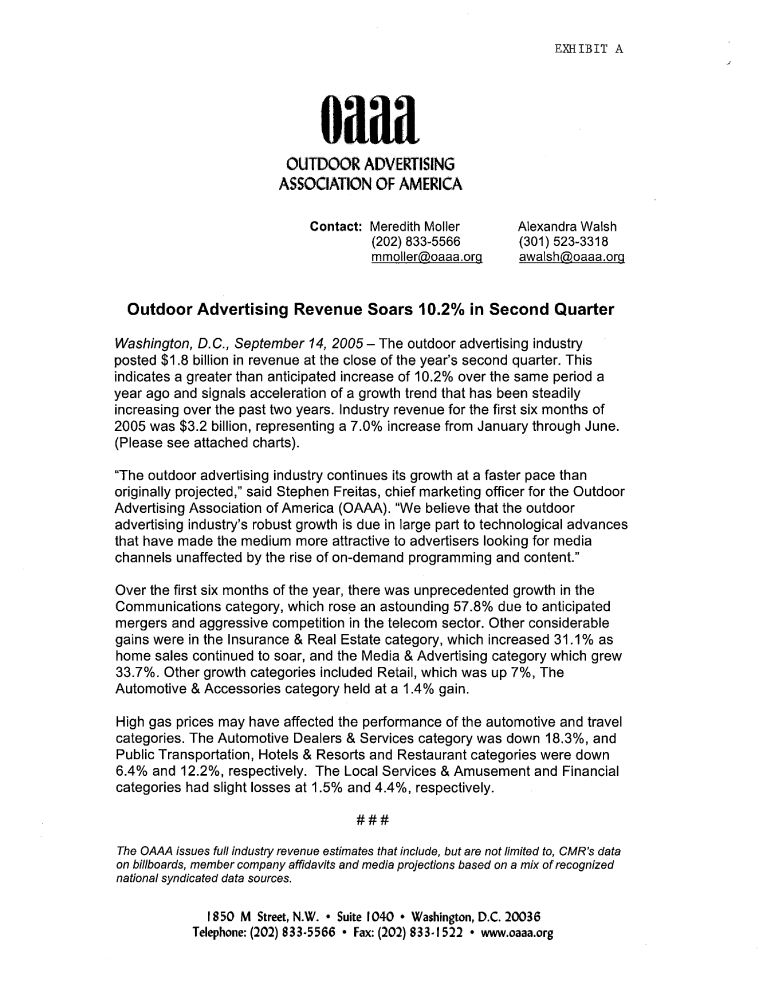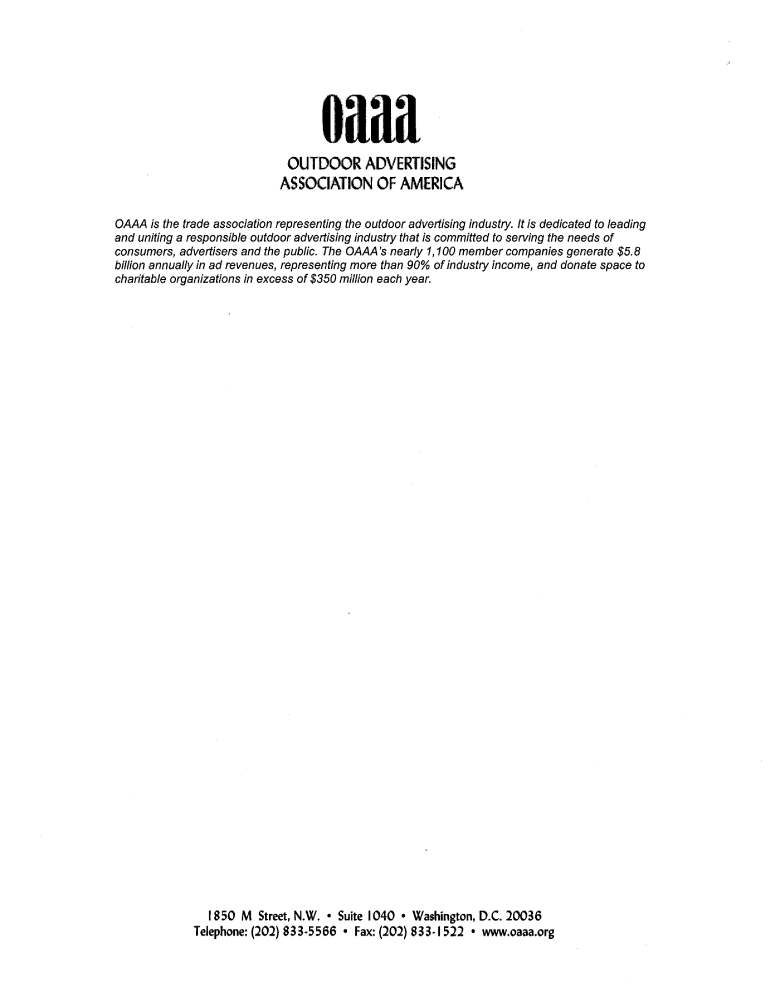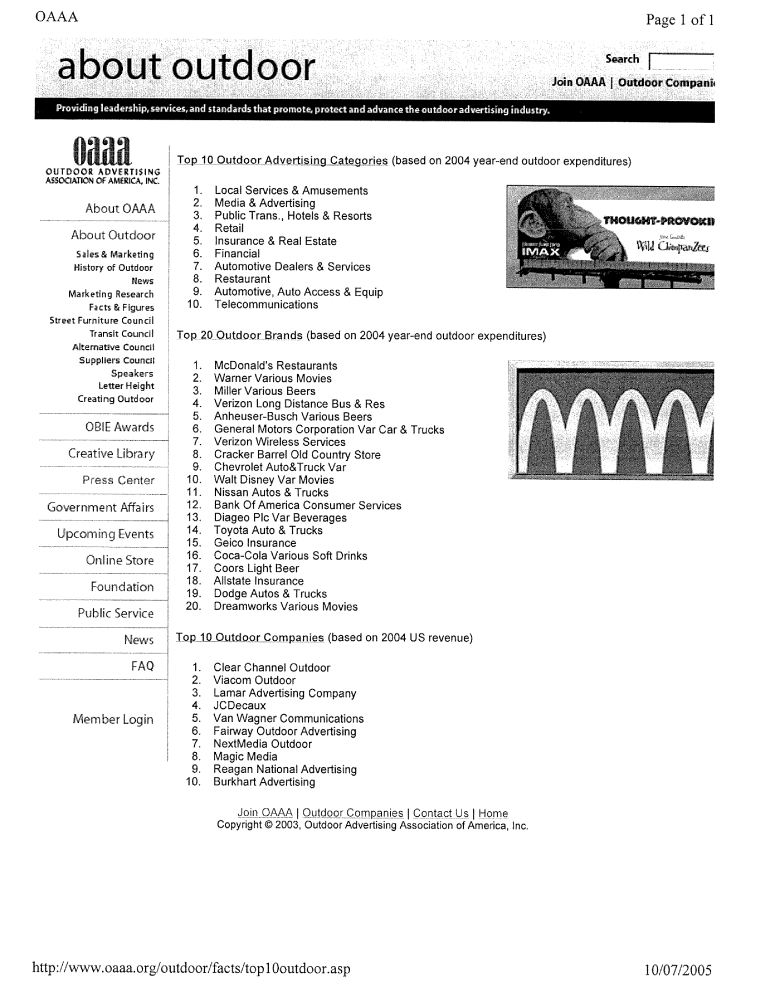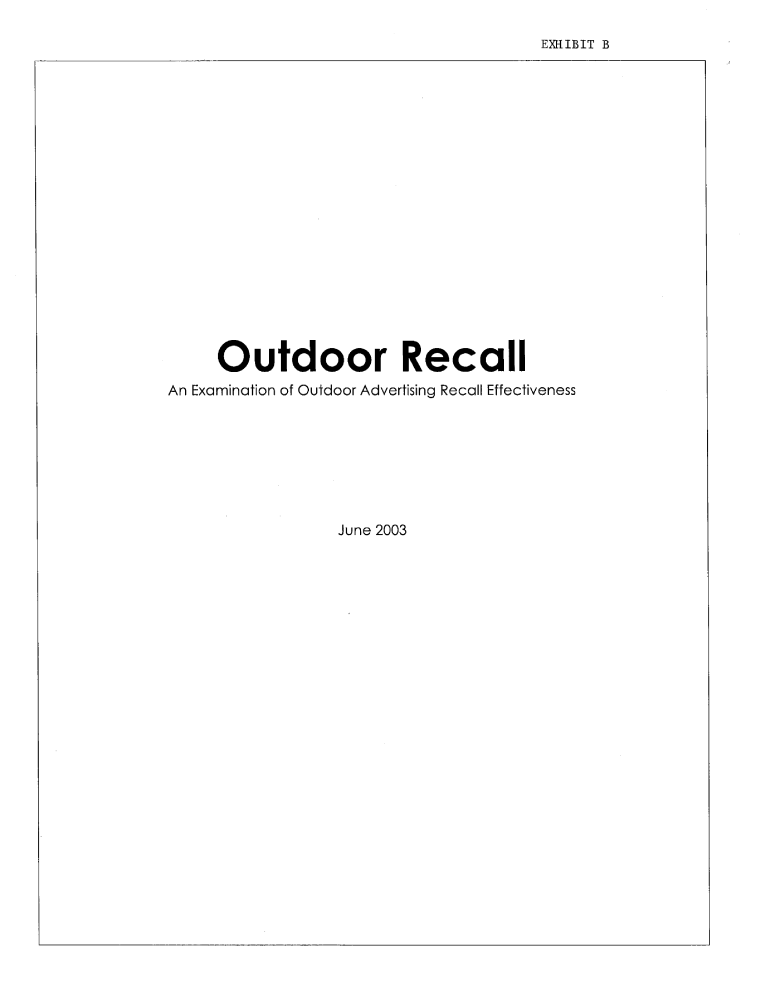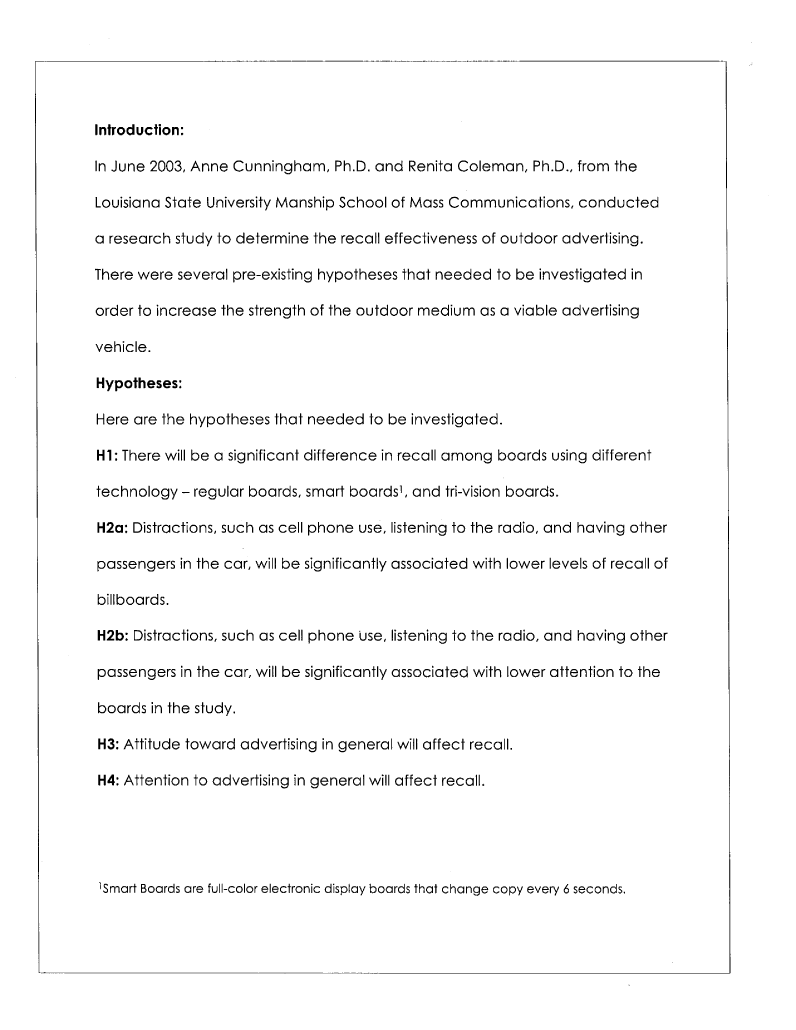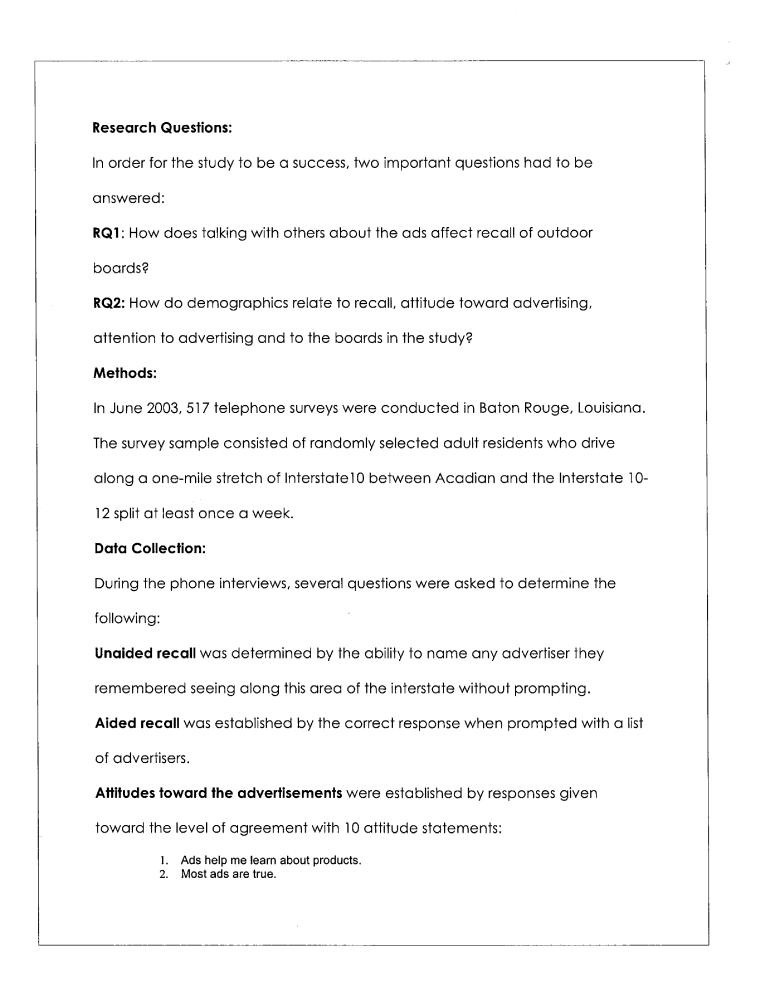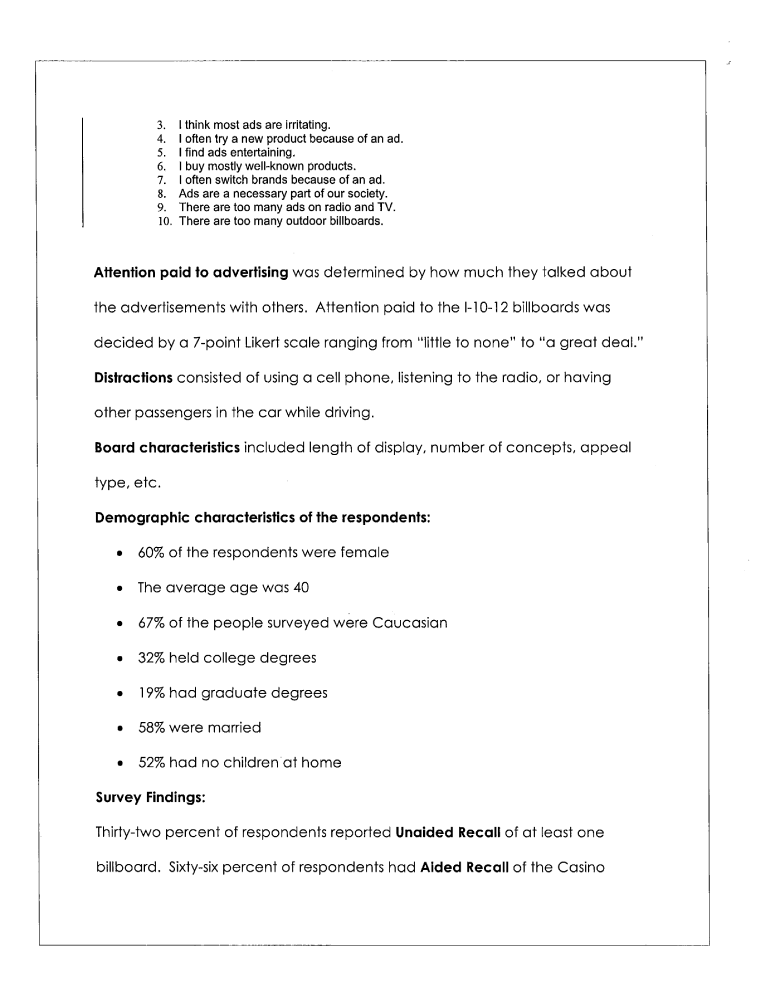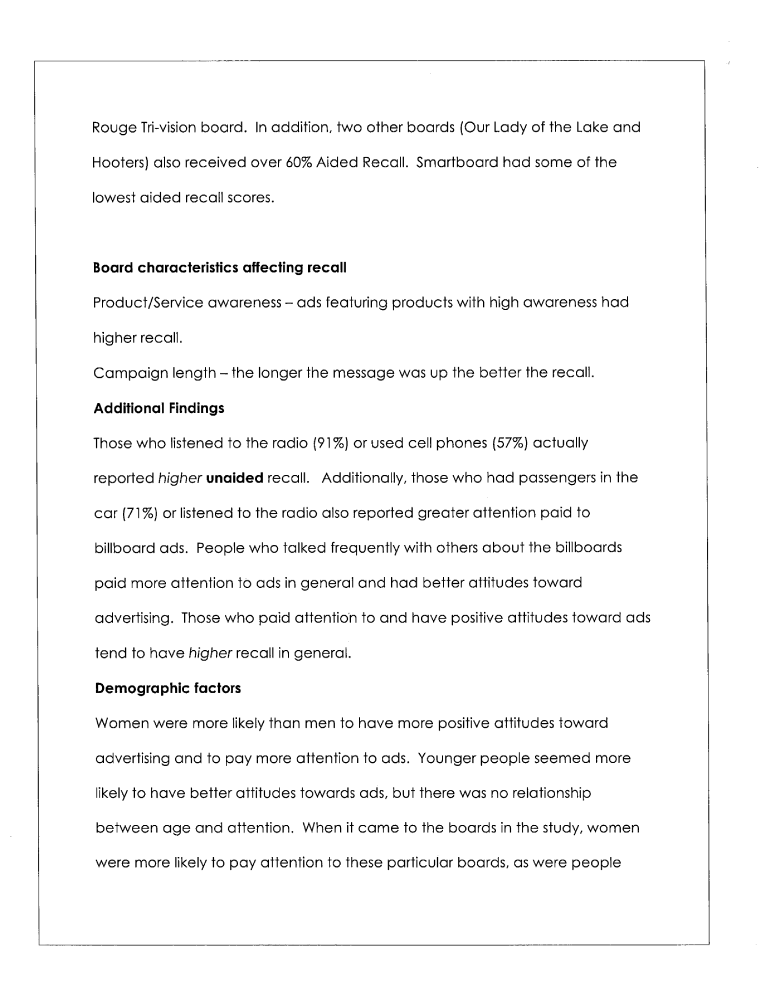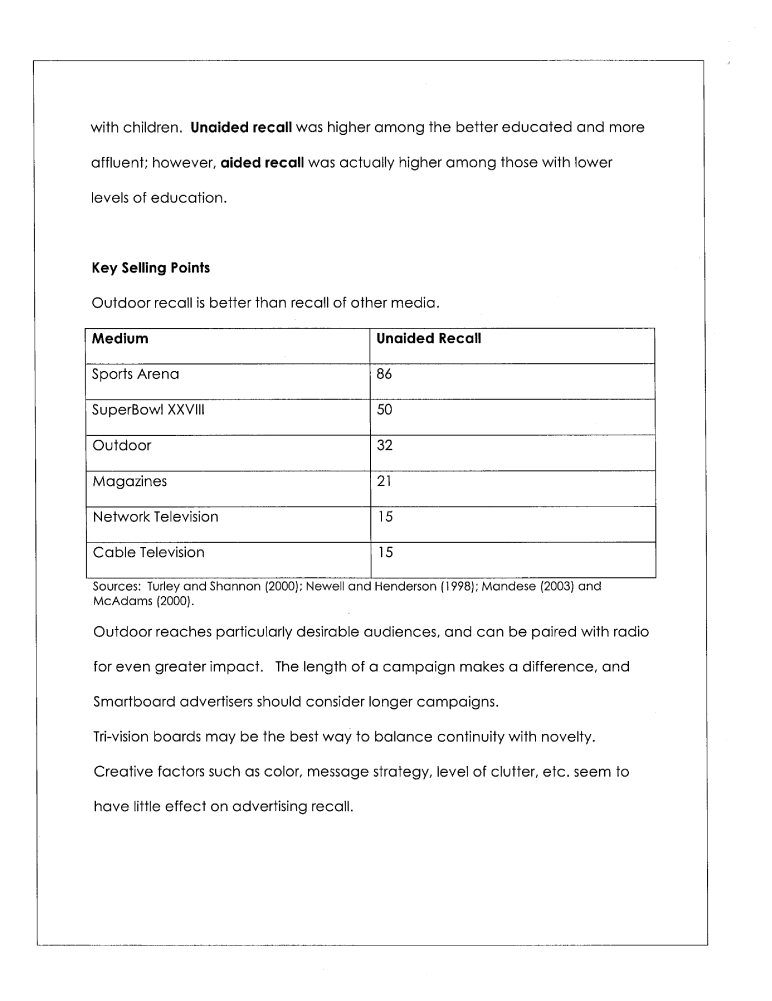Published on October 14, 2005
Fulbright & Jaworski L.L.P.
A Registered Limited Liability Partnership
300 Convent Street, Suite 2200
San Antonio, Texas 78205-3792
www.fulbright.com
San Antonio, Texas 78205-3792
www.fulbright.com
dlansdale@fulbright.com
|
telephone: | (210) 224-5575 | ||
direct dial: (210) 270-9367
|
facsimile: | (210) 270-7205 |
October 13, 2005
BY EDGAR AND OVERNIGHT COURIER
Securities and Exchange Commission
Division of Corporation Finance
100 F Street, N.E.
Mail Stop 0308
Washington, D.C. 20549
Attention: Ted Yu
Division of Corporation Finance
100 F Street, N.E.
Mail Stop 0308
Washington, D.C. 20549
Attention: Ted Yu
| Re: | Clear Channel Outdoor Holdings, Inc. | |||
| Registration Statement on Form S-1 | ||||
| File No. 333-127375 |
Ladies and Gentlemen:
On August 10, 2005, Clear Channel Outdoor Holdings, Inc. (the Company) filed its
Registration Statement on Form S-1 (the Form S-1) relating to the initial public offering of
shares of its Class A Common Stock. The Company filed Amendment No. 1 to the Form S-1 on August
17, 2005 and Amendment No. 2 to the Form S-1 on September 26, 2005. By letter dated October 6,
2005, the Company has received the Staffs additional comments relating to the Form S-1 (the
"Comment Letter).
In response to the Comment Letter, the Company has filed Amendment No. 3 to the Form S-1 (the
"Amendment). The following numbered paragraphs repeat the comments in the Comment Letter for your
convenience, followed by the Companys responses to those comments.
1) We note your response to prior comment 1 of our September 9, 2005 letter. In your response
letter, and with a view towards disclosure, please explain how the issuance of the $2.5 billion
intercompany note helped set the appropriate capitalization for the company and maximize the
value of Clear Channel Communications investment in the company. Explain the companies reasoning
for the decision to set the appropriate capitalization, including how they determined what
capitalization was appropriate and the basis for this determination.
Response: In determining the size of the $2.5 billion intercompany note and the appropriate
capitalization of the Company, the Company considered two primary factors:
(i) The Company set the indebtedness amount at a level at which it believes it will
reasonably and comfortably be able to service its debt obligations in the future. In
Houston New York Washington DC Austin Dallas Los Angeles Minneapolis San Antonio Hong Kong London Murich
Securities
and Exchange Commission
October 13, 2005
Page 2
October 13, 2005
Page 2
determining comfort with this level, the Company analyzed commonly used coverage ratio
metrics such as operating income before depreciation, amortization and non-cash compensation
expense divided by interest expense. The Company believes that its cash flows from
operations will be sufficient to fund its interest on indebtedness obligations for the
foreseeable future.
(ii) The Company analyzed the leverage levels of peer companies in the outdoor advertising,
radio, television and other media industries as measured by commonly used ratios such as
total indebtedness divided by operating income before depreciation, amortization and
non-cash compensation expense. The Company believes that its capitalization and leverage
levels are in line with other peer companies.
In determining whether to issue intercompany or third party debt, the Company assessed the
impact that third party debt would have on the total amount of indebtedness, the interest coverage
ratios and the credit profile and quality of Clear Channel Communications, the Companys parent
corporation. Since Clear Channel Communications will own a majority of the capital stock of the
Company after the initial public offering, the Companys third party debt would be consolidated at
the Clear Channel Communications level, while any intercompany debt would be eliminated in
consolidation. Also, as noted in the Risk Factors section, since any deterioration in the
financial condition of Clear Channel Communications could adversely affect the Companys access to
the credit markets and increase the Companys borrowing costs, the Company determined that
intercompany debt would provide more financial flexibility and would minimize the Companys cost of
future liquidity as compared to third party debt.
Finally, the Company believes that the issuance of the $2.5 billion intercompany note and the
resulting leverage levels on the Company maximize the value to public investors and Clear Channel
Communications stake in the Company by setting a weighted average cost of capital for the Company
and its investors that most optimally reflects the asset mix and risks of the Company.
The
Company has revised the disclosure on page 121 accordingly.
Prospectus Summary, page 1
2) The business discussion in your prospectus summary is still overly lengthy. Please further
reduce the length of the discussion by focusing on only the key aspects of your business and
strategy. For example, consider reducing the length of the Competitive Strengths, Our
Strategy, and Our Business sections. Detailed discussions can be included in the Business
section rather than in the prospectus summary.
Response: The Company has revised the disclosure in the prospectus summary by shortening the
Our Business, Our Competitive Strengths and Our Strategy sections on pages 1, 2 and 3.
Securities
and Exchange Commission
October 13, 2005
Page 3
October 13, 2005
Page 3
Risk Factors, page 14
3) Please avoid using generic and vague phrases as such may affect our advertising revenues
or may affect our ability to conduct business in your subheadings and discussions. Instead, use
more descriptive phrases so that readers can better understand the risks effects.
Response: The Company has revised the disclosure in the Risk Factors section accordingly.
Doing business in foreign countries ... page 14
4) We note the revisions made in response to prior comment 22 of our September 9, 2005 letter.
Please explain how each factor listed on pages 14-15 could specifically result in disruptions to
your business or financial losses in your international operations.
Response: The Company has revised the disclosure on page 15 under the heading Doing business
in foreign countries . . . accordingly.
Antitrust regulations may limit future acquisitions ... page 16
5) Please explain the effect on your business and strategy if the Department of Justice,
Federal Trade Commission, or foreign antitrust agencies take the actions described on page 15.
Response: The Company has revised the disclosure on page 16 under the heading Antitrust
regulations may limit future acquisitions . . . accordingly.
Managements Discussion and Analysis, page 43
6) We note your response to prior comments 35 and 38 of our September 9, 2005 letter. As
stated in Release No. 33-8350, a good overview section should provide insight into material
opportunities, challenges and risks, such as those presented by known material trends and
uncertainties, on which the companys executives are most focused for both the short and long term,
as well as the actions they are taking to address these opportunities, challenges and risks. Your
response to prior comment 38 indicates that the state of the economy and advertising market have
the most immediate material uncertainty surrounding the companys business; please disclose this
fact more prominently in your MD&A section. Your response also indicates that management is not
currently aware of any trends relating to these factors, as well as any geological events and
government regulations, that could impact the companys operations. This belief on the part of
management should also be disclosed prominently.
Response: The Company has revised the disclosure on pages 45 and 46 under the heading
Overview Factors Affecting Results of Operations and Financial Condition accordingly.
Securities
and Exchange Commission
October 13, 2005
Page 4
October 13, 2005
Page 4
Use of OIBDAN, page 53
7) We note that the international segments OIBDAN remained relatively flat for the six
months ended June 30, 2005. Please provide quantified disclosure rather than vague phrases such as
relatively flat. Also quantify the revenue decline in France. Make similar revisions
throughout the prospectus, as applicable.
Response: The Company has revised the disclosure in the first paragraph under the table on
page 56 accordingly.
8) Please refer to prior comment 42. Please revise your disclosure to reconcile your segment
OIBDAN to your segment operating income. Also, comply with this comment throughout the filing
where segment OIBDAN is presented.
Response: The Company has revised the tables on pages 12, 43 and 55 to 56 accordingly.
Financial Condition and Liquidity, page 54
9) Please refer to the discussion of your investing activities for the six months ended June
30, 2005 on page 55. Indentify the nonconsolidated affiliate.
Response: The Company has revised the interim period disclosure under Investing Activities
on page 57 accordingly.
10) Please tell us if the reference to 2003 is a typographical error. If not, tell us how it
relates to the change between the six months ended June 30, 2005 as compared to the six months
ended June 30, 2004.
Response: The reference to 2003 in the interim period disclosure under Investing Activities
on page 57 is a typographical error and has been corrected.
Liquidity, page 55
11) Please refer to the first full paragraph on page 56 (Management believes ...). Please
quantify the period of time that management believes future funds from operations and available
borrowing capacity will be sufficient to fund your debt service requirements, working capital
requirements, capital expenditure requirements and costs of this offering.
Response: The Company has revised the disclosure in the second paragraph under Liquidity
Sources of Capital on page 58 accordingly.
12) Please refer to your discussion of the uncommitted revolving demand promissory note on
page 57. We note the cross-reference to the Cash and cash equivalents; cash management policies
discussion. Please clarify the relationship of the uncommitted revolving demand promissory note to
the cash management policies. Is the uncommitted revolving
Securities
and Exchange Commission
October 13, 2005
Page 5
October 13, 2005
Page 5
demand promissory note the same as the
cash management note[s] discussed on page 58? If not, then disclose the material terms of the
uncommitted revolving demand promissory note (e.g., amount available and interest rate).
Response: The Company has revised the disclosure in the first paragraph under Liquidity
Sources of Capital on page 58 to remove references to the uncommitted revolving demand promissory
note and simply refer to the cash management note issued by the Company to Clear Channel
Communications, since they are the same.
13) Please refer to prior comment 49. Revise your disclosure to quantify your short-term and
long-term cash requirements. Your discussion should include the funds necessary to maintain
current operations and any commitments for capital expenditures and other expenditures.
Response: The Company has revised the disclosure by adding the third paragraph under
Liquidity Sources of Capital on page 58 accordingly.
Industry Metrics, page 66
14) Please provide us with copies of the relevant excerpts from the OAAA report cited here.
Disclose the basis of your belief that the growth rate for outdoor advertising was higher than the
overall U.S. advertising growth.
Response: The Company has attached as Exhibit A to this response letter the relevant excerpts
from an OAAA press release and the OAAA website. In addition, the Company has revised the
disclosure on page 69 in the first paragraph under the heading Industry Metrics to provide the
basis for the Companys belief. Finally, the Company has included in the disclosure a statement
regarding the recall rate for outdoor advertising. A summary of the research that supports this
statement is attached as Exhibit B to this response letter.
Corporate Services Agreement, page 102
15) We note your response to prior comment 64 of our September 9, 2005 letter. Please
elaborate on the ratio of your OIBDAN to the total Clear Channel Communications OIBDAN and how
the allocable portion of the compensation costs and benefits are based on this ratio.
Response:
The Company has revised the disclosure in the fourth paragraph on page 106
accordingly.
Combined Statement of Operations, page F-4
16) Please refer to prior comment 73. We understand that your divisional operating expenses
include both cost of services and selling, general and other administrative expenses. Please
segregate these line items on your statement of operations. Refer to Rule 5-03(b)(2) of Regulation
S-X.
Securities
and Exchange Commission
October 13, 2005
Page 6
October 13, 2005
Page 6
Response: The Company has segregated divisional operating expenses into direct expenses and
selling, general and administrative expenses in the Amendment. The Company has not updated the
interim periods but will provide the interim numbers by a future amendment.
Combined Statements of Cash Flows, pages F-6 and F-32
17) Please revise to include the impact of your foreign currency translations in the
applicable line items(s) in operating activities.
Response: The Company has revised the Combined Statements of Cash Flows on pages F-6 and F-32
accordingly.
18) Please tell us why the line item, Net cash transferred to Clear Channel Communications,
is presented as a financing activity.
Response: The line item Net transfers (to) from Clear Channel Communications reflect the
changes in the Due from Clear Channel Communications account during the periods. The Companys
operating cash is swept by Clear Channel Communications and accounted for through the Due from
Clear Channel Communications account. Although the increase in operating cash was not applied
against the Companys outstanding intercompany debt balance, it is a component of the Companys
financing transactions with Clear Channel Communications. As such, the Company believes presenting
this increase as a financing activity is appropriate. It is the Companys intention to apply the
outstanding balance of the Due from Clear Channel Communications account at the time of the
initial public offering to repay a portion of the outstanding intercompany debt with Clear Channel
Communications. Therefore, the Company reclassified this account from operating activities to
financing activities.
******
Securities
and Exchange Commission
October 13, 2005
Page 7
October 13, 2005
Page 7
If any member of the Staff has any questions concerning these matters or needs additional
information or clarification, he or she should contact the undersigned at (210) 224-5575.
| Very truly yours, |
||||
| /s/ Daryl L. Lansdale, Jr. | ||||
| |
Daryl L. Lansdale, Jr. | |||
cc:
|
Larry Spirgel (Securities and Exchange Commission) | |
| Michele M. Anderson (Securities and Exchange Commission) | ||
| Robert Carroll (Securities and Exchange Commission) | ||
| Dean Suehiro (Securities and Exchange Commission) | ||
| John Tippit (Clear Channel Communications, Inc.) | ||
| John W. White (Cravath, Swaine & Moore LLP) |
